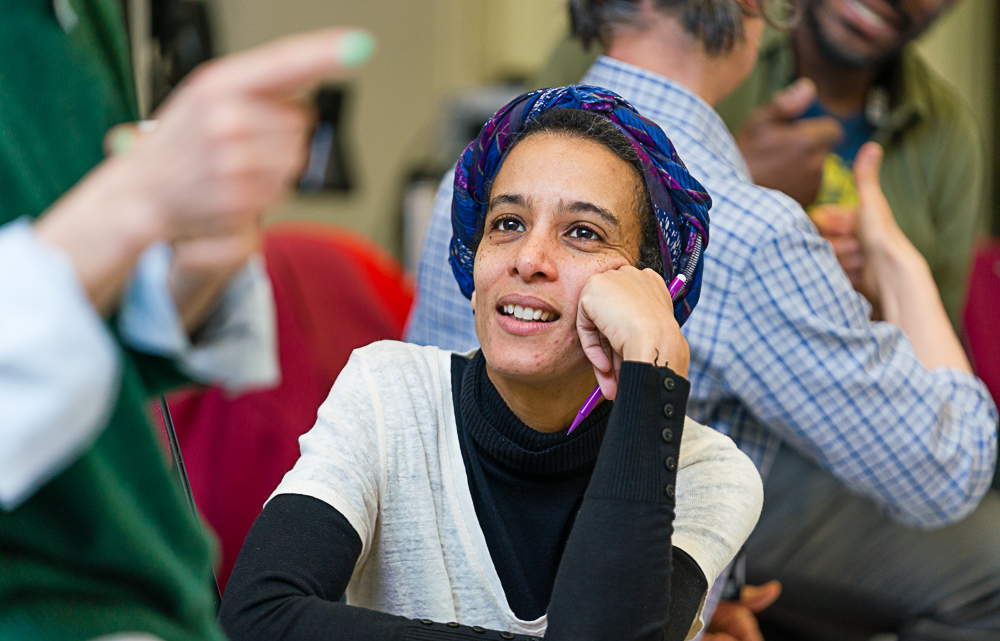
17 Mar A Sense of Direction: Laila Diallo
Careers in the arts do not come much more varied than that of Laila Diallo. The Canadian-born, Bristol-based dancer, choreographer and movement director has worked extensively both on stage and off, both in front of the camera and behind it, both across the UK and around the world – and it is that variety that she finds fulfilling.
“Ever since I was a kid, I’ve always had quite a lot of interests,” Diallo says. “I’ve always been curious about everything. I like doing new things. I like putting myself in situations where I’m thinking, ‘Oh, I actually don’t know how I’m going to do this, or how good I’m going to be at it, but I’m going to give it a really good go regardless.’”
Building a career in choreography and movement direction can be difficult, she continues, but it helps if you are able to set your own definition of success, and constantly re-evaluate it. “When you are not too prescriptive about what you want to be doing, it opens up avenues and opportunities that can be really fulfilling,” she adds. “And it keeps things interesting, too”
“I often stop and think how crazy it is, in a sliding doors way, that I have ended up here in Bristol doing the jobs that I do,” she continues. “I can easily imagine how it might have worked out differently, and I might have ended up somewhere else doing something entirely different, but I just stayed open-minded with the opportunities that came my way.”
***
Diallo hails from Quebec City, in the French-speaking part of Canada. She first found dance by following a childhood friend to a class, and discovered that she both enjoyed it and excelled. She graduated from L’Ecole de Danse de Quebec – the Quebec School of Dance – in 1996, and was faced with a choice: keep pursuing performance, or follow one of her many other interests instead?
“Dance was great, but there were lots of other things I thought about doing, too,” Diallo remembers. “I could’ve gone to university and studied philosophy, or something like that. In the end, I decided I would stick with dance, for a bit at least, and use it as an excuse to travel.”
She first went to France and studied with legendary contemporary choreographer Régine Chopinot for several months, before arriving in England to complete her training at the London Contemporary Dance School. She subsequently spent seven years with Wayne McGregor’s acclaimed Random Dance Company and three years as an associate artist at the Royal Opera House, then embarked on her career as a solo dancer and freelance choreographer and movement director.
“It has always been contemporary dance for me, really,” Diallo reflects. “I enjoyed classical dance to a degree when I was growing up, but there always seemed to be a particular way of doing things. You always had to fit a certain mould, and I found that a bit overpowering. I wanted more space to be inventive and expressive and explore the spaces in between people.”
Along the way, Diallo has been involved in some extraordinary productions, from the original Royal Court run of Sarah Kane’s Cleansed, to the fourth Harry Potter film, to Shakespeare on the main stage at the National Theatre. Now based in Bristol, she continues to create her own, globetrotting work – her latest solo work is 1:1, a short film made with MAYK for the Women of the World Festival in Istanbul – alongside her choreography and movement direction.
***
Diallo’s latest project is providing the movement direction for Sally Cookson’s production of Ross Willis’ new play Wonder Boy at the Bristol Old Vic, a family-friendly story about a young boy with a stammer, designed to be accessible both hearing and d/Deaf audiences alike. It is, Diallo says, another first for her because she is working British Sign Language into her choreography.
“It has been a beautiful challenge to marry the different physical languages at play,” she says. “Key to all of it has been having a d/Deaf consultant, David Ellington, in the room. That really helps in getting it right, and in avoiding some of the blind spots we have as hearing creatives. He can step back and say, ‘This part is really clear’, or, ‘Actually, I’m really missing this bit of the story.’”
This Bristol Old Vic production builds on the pioneering work done by companies like Graeae and Deafinitely, and by the d/Deaf and disabled theatre consortium Ramps On The Moon in incorporating access tools into the very core of a show from the beginning. It has been, says Diallo, an eye-opening experience.
“I wish I had encountered this kind of work sooner myself,” she says. “In fact, I wish it was part of everybody’s training, because it really expands your toolbox as an artist. I think every movement director and choreographer out there should give it a go if they get the chance.”
Diallo’s career now is a balance between working on different productions as a movement director and choreographer, and pursuing her own solo projects. It is, she says, sometimes a hard balance to strike, but an important one if she is to keep finding fulfilment.
“I find it harder to make space for my own stuff nowadays than I used to,” she reflects. “It’s much easier to be responsive instead, and just take on the work that people come to me with. I have to be quite strict. I have to carve out the time to get personal projects off the ground, or even just the time to think about what my next work might be. I have had to learn to say no to things, so I can keep pursuing my own interests.”
—
Laila Diallo was speaking to Fergus Morgan for SDUK.
